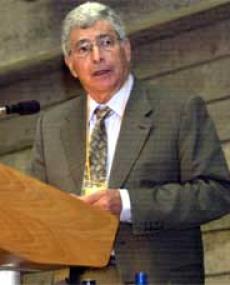
Justice Arthur Chaskalson was born in Johannesburg on 24 November 1931. In 1952 he graduated from the University of the Witwatersrand with a B.Com, and in 1954 he obtained his LLB Cum Laude. Two years later he was admitted to the Johannesburg Bar. A keen soccer player, he was a member of the University’s soccer team and was selected for the Combined South African Universities soccer team in 1952.
Chaskalson acted as defence counsel in a number of important political trials during the apartheid era, including the Rivonia trial in 1963-1964 in which former President Nelson Mandela and other African National Congress (ANC) leaders were sentenced to life imprisonment.
As founding member and director of an organisation that sought to pursue justice and human rights in South Africa, the Legal Resources Centre, he challenged the implementation of several apartheid laws. Justice Chaskalson was director from its inception in 1978 until 1993.
Recognized as an expert in constitutional law, Justice Chaskalson was a consultant to the Namibian Constituent Assembly, was a member of the Technical Committee on Constitutional Issues in South Africa, and a consultant to the Multiparty Negotiating Forum. He was a consultant to the African National Congress during the constitutional negotiations, and a member of the Multiparty Negotiating Forum's Technical Committee on Constitutional Issues. In that capacity he participated in drafting an interim Constitution.
Chaskalson’s official role at the negotiations was as chairman of the "technical committee".
He was a member of the Johannesburg Bar Council from 1967 to 1971 and from 1973 to 1984, the Chairman of the Johannesburg Bar in 1976 and again in 1982, a member and later Convenor of the National Bar Examination Board (1979-1991), and the Vice Chairman of the General Council of the Bar of South Africa (1982-1987).
He has been a member of the Board of the Faculty of Law of the University of the Witwatersrand, Johannesburg (1979 – 1999), was an Honorary Professor of Law at that University from 1981 to 1995, a member of its board for the Centre for Applied Legal Studies from 1979 to 1994, a member of the National Council of Lawyers for Human Rights (1980-1991), was Vice Chairman of the International Legal Aid Division of the International Bar Association (1983-1993) and Chairman of the Rhodes Scholarship Selection Committee for South Africa (1988-1993).
In June 1994, he became the first President of South Africa's new Constitutional Court, the highest court in South Africa where constitutional matters are concerned. On 22 November 2001 he became the Chief Justice of South Africa until his retirement in 2005.
He has received several honorary doctorate degrees: in 1986 from the University of Natal, in 1990 from the University of the Witwatersrand, from Rhodes University in 1997 and from the University of Amsterdam in 2002. Awards include the Premier GroupAward for prestigious service by a member of the Faculty of Lawat the University of the Witwatersrand (1983), the Claude Harris Leon Foundation Award for community service (1984) and the Wits Alumni Hour Award for exceptional community service (1984).
According to eminent South African advocate, Jeremy Gauntlett, "Chaskalson's professional life was marked by three stages. First he was the most cerebral of advocates. His manner was formal, even cold - a devastating cross-examiner, clear but soft-spoken in argument. His manner may have dissuaded an easy camaraderie, but he was a natural leader at the Bar. Twice chairman of the Johannesburg Bar, and for five years Vice-Chairman of the General Council of the Bar, he led South Africa's advocates in innumerable confrontations with the Vorster then Botha governments over legislative and executive measures striking at human rights and an independent administration of justice."
In 1990 he received (together with Dr S. Magoba) the Human Rights Award of the Foundation for Freedom and Human Rights in Berne, Switzerland. He has also received awards for his human rights work from the South African Jewish Board of Deputies and the General Council of the Bar of South Africa.
In 2002, the South African Government conferred the Order of the Counsellor of the Baobab in Gold for Exceptional Service in Law, Constitutional, Jurisprudence and Human Rights on him. The Order of the Baobab is one of the highest awards given to citizens in South Africa.
On 31 May 2005, Chaskalson retired from his role as Chief Justice, and was replaced by his former deputy Pius Langa.
Chief Justice Chaskalson passed away in Johannesburg, South Africa on Saturday, 1 December 2012,after a brief illness. He is survived by his wife Dr. Lorraine Chaskalson and two sons, Matthew and Jerome.
The former President of the Constitutional Court and Chief Justice was given a Special Official Funeral, and all national flags were at half-mast at all flag stations in the country from Monday until the 7 December. The South African Government also arranged an official memorial service for the Chief Justice.